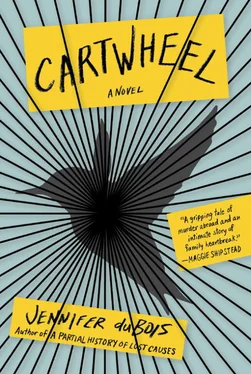“You could have both been involved. That happens all the time.”
“Well, yes,” said Sebastien. “But they know that only one gentleman had a biological role in the events, which would make my role—what, exactly? Aesthetic? Spiritual? Light direction? Was I the key grip? It’s all a little narratively awkward, even for that horrid prosecutor’s crazed imagination.”
At this, Anna’s face seemed to close, and Sebastien knew he’d made a mistake. What was he doing? He was joking, perversely, horribly. How could he ever go testify on a stand in front of normal people? He couldn’t even talk to Lily’s sister without convincing her of his total unsoundness, if not his actual guilt.
“I’m sorry,” he said. “But you understand what I’m saying. You’re a reasonable person. I apologize for my flippant tone. One gets a little defensive in emergencies, as I’m sure you’ve noticed in your sister.”
“This is true,” said Anna coldly. “Though my sister doesn’t exactly need an emergency to be defensive, does she?”
Sebastien hadn’t meant to be digging for information here, particularly, but still he felt a shameful welling of hope at the thought that he might have found some. “What do you mean?” he said.
“Well,” said Anna. “She’s got something of a persecution complex, right? Thinks the whole world revolves around the gaping vacuum of her needs? Thinks she’s the only one in the universe for whom pragmatism is a major crisis of the soul?”
Sebastien was stunned. He opened his mouth and closed it again. His teeth clacked together audibly.
“Haven’t noticed any of this?” said Anna. “No, I suppose you wouldn’t. Someone who thinks their need is the vortex of reality can make anyone attending to those needs feel pretty central, too.”
Sebastien would put away these claims; he would save them for later review. At some point, he knew, he would greedily consume them; he would be willing to consider their every angle, as well as their possible truth. But for now, Anna had said an incredibly uncharitable thing about a person she was supposed to love—a person Sebastien himself loved—and who was, at this very moment, defenseless, in every possible sense of the word.
“My heavens,” said Sebastien. Chivalry, regretfully, demanded bitchiness. “And Lily said you didn’t have an original thought in your head.”
“Ha,” said Anna. “I don’t, of course. But in my family, knowing that is the original thought.”
Sebastien blinked. “Lily loves you,” he said. “For whatever it’s worth. And she has absolutely no idea that you hate her.”
“I don’t hate her.” Anna shook her head vigorously. “I love her. How could I not? I mean, everyone wants to love Lily. That’s the whole thing. Everyone wants to love her, everyone wants to think she means well. And it’s not that she doesn’t. It’s just that she can’t see how much it matters whether people want to give you a break. That’s why she’s in this mess. It’s because for her whole life, she’s been playing by different rules from everyone else.”
“Rules!” Sebastien scoffed. “Pah! What rules? It’s anarchy and lawlessness all the way down.”
“That’s not true,” said Anna. “There are rules for people, and there are different rules for Lily. Or there were, anyway. And she never knew it, which is why she’s in so much trouble now. Because she couldn’t stop herself from doing that cartwheel, or from talking to that asshole prosecutor without a lawyer, or all these other dumb things. Because she never had to learn to live in a world that didn’t necessarily want to go easy on her.” Anna stood. You really could tell that she was an athlete—her posture was impeccable, nearly militaristic, reflecting more alertness than Sebastien could ever remember feeling in his life. “Anyway,” she said. “Okay. This has been less than totally illuminating, but I guess I believe that you didn’t consciously screw my sister over.”
“How flattering.”
“Well, that’s definitely what I’m going for, so.” Anna shook her head, and when she spoke again, her voice had softened. “No, I mean, I know you care about her. I can tell. You know there’s a site where you can donate? For my parents’ travel and stuff.” She opened her bag and produced a pen and paper—Sebastien was relieved he was not going to be summoned to locate these objects in his own house—and scribbled the address of the website. She was, he noticed with mildly senseless surprise, left-handed. “If you really do want to help. That’s how you could help.”
“I’ll do that.”
“Maybe you will.”
Anna turned to leave. In profile, she looked more like Lily than she had from the front.
“Tell her that I didn’t sleep with Katy,” said Sebastien. “Please.”
“I don’t know that that’s true.”
“Tell her that I said it, anyway. Put it in scare quotes. Do an impression, if you have to. Adopt a funny voice. Say it’s an unconfirmed report. But tell her I said it.”
“Okay,” said Anna. “I will.”
She was out the door, and Sebastien spent a moment walking aimlessly around the room. He stared at the ingots of light coming in from the windows; he stared at the bleached humps of his furniture and tried to see what Anna would have seen. Then he padded back into the kitchen and heard the strangely sickening crunch of wheels on gravel. He opened the door just in time to see Anna get into a car with Eduardo Campos and drive away.
Eduardo had driven out to Palermo on something like a whim. He’d been short-tempered all morning at the office, and had no meetings scheduled for the afternoon. When he walked outside at noon, he found that the sky above him was pearlescent, like the interior of a clamshell, and that he did not wish to head straight home. Maria might call him at the office, of course, and be surprised to find him gone—but it would not kill her, Eduardo decided, to have to wonder about his impetuousness for once. It would not destroy her to have to sit for a moment with the fact that she did not know where he was, and that there was nothing she could do about it. And in light of Ignacio Toledo’s confession, it was time—high time—that Eduardo paid Sebastien LeCompte another visit.
When he turned up the hill toward the mansion, Eduardo found himself involuntarily glancing over at the Carrizos’ house, then scolded himself for doing it. It was, after all, just a house. And this case was, after all, just a case—even if it had consumed the city, then the country, then decent chunks of the world; even if it had animated innumerable listless attention spans; even if it had brought teenagers out at night to honk and yell. Eduardo reached the top of the hill and killed the engine. At the Carrizos’, all the lights were out. What was the lurid appeal of this place, really? Murder was incomprehensible, yes—but when you got right down to it, so was almost everything people did. Eduardo got out of the car. He endured a brief, ghostly longing for a cigarette, like a twinge from a phantom limb. And then Sebastien LeCompte’s door opened and Lily Hayes walked out of the house.
Eduardo felt a surge of adrenaline. He looked again. But no, of course it was not Lily. Of course, it was the sister. He’d seen the girls’ resemblance in family photos—their matching quadrilateral faces, bracketing the redheaded mother and the mild-eyed father (who appeared, at least in pictures, to be constitutionally incapable of any sort of combativeness). But the sisters were, apparently, much more alike in real life. They were not exactly identical—this one was more compact and her skin looked better, though Eduardo couldn’t tell whether this was due to a bit less living or a lot more attention—but these differences seemed circumstantial, especially now. This girl—who had still not seen Eduardo—was just a Lily who exercised and wore sunscreen. And Eduardo was struck now by the unnerving sense that these girls were not different people at all, but just the same girl in different lives.
Читать дальше












